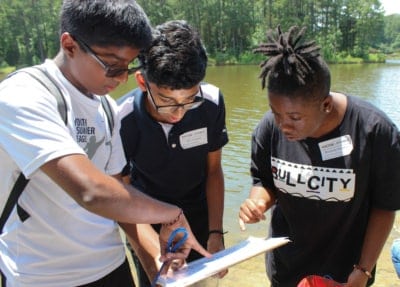LAST WEEK’S RESULTS
The US didn’t qualify for the World Cup this year, so how are you deciding who to cheer for?


QUOTES FROM LAST WEEK
Go Central and South American countries! If not US then let’s go Americas!
-Ben from Raleigh
Nobody!! I won’t watch a minute of it. Boring as watching grass grow.
-Greg from Moravian Falls
THE QUESTION OF THE WEEK
“Highly stressful experiences, like witnessing violence and the separation of children from loving parents, can disrupt children’s brain architecture and affect their short- and long-term health by causing an extreme stress response,” wrote Dr. Julie Linton of Wake Forest Baptist Medical Center earlier this month in a guest column for the Winston-Salem Journal. Dr. Linton is describing the physical effects of adverse childhood experiences (ACEs). Have you heard of ACEs before?
OUR PICKS
Hiding My Depression Almost Destroyed My Job | Bloomberg 6/11/2018
“Such stories — or rather the accumulation of such stories — convey a brutal truth: Depression is far more commonplace than you might think.”
Trying to Kill the Want | Longreads August 2018
“Grow up with nothing but a few sequined felt camels standing between you and your mother’s anger, and you will be tough, even if it looks to others like fear.”
|
|---|
NATION’S NOTES
Like so many children, I grew up watching Mister Rogers’ Neighborhood — particularly over the summer when I stayed with my great grandmother, aka Nana. Mister Rogers’ quiet civility and essential kindness showed us all what we should aspire to be as children. I can still remember my Nana reminding us to consider what Mister Rogers might say when we’d act up.
This week I had the pleasure of walking down memory lane by viewing the recent documentary of Mister Rogers’ work called “Won’t You Be My Neighbor?” It provides a measure of nuance to Mister Rogers off of the camera, but one thing that stood out throughout the documentary was his passion for children. He wanted children to be seen, and he wanted them all to feel appreciated. He was intensely focused on leading them through difficult conversations ranging from the assassination of Bobby Kennedy to the explosion of the Challenger. His discussion around grief hit me square in the gut given the loss of my wife just a few years ago. It made me wish that I had seen those episodes when I was a child.
As I walked out of the theatre, I began to wonder what Mister Rogers might be telling our children today. What lessons would he offer? What suggestions might he make? If you have ideas, send an email to nhahn@ednc.org. I’d love to know your thoughts.
All the best,
Nation
We want to hear from you.
Got a question? Have feedback for us? Want us to explore an issue in your community? Email and tell us about it.


